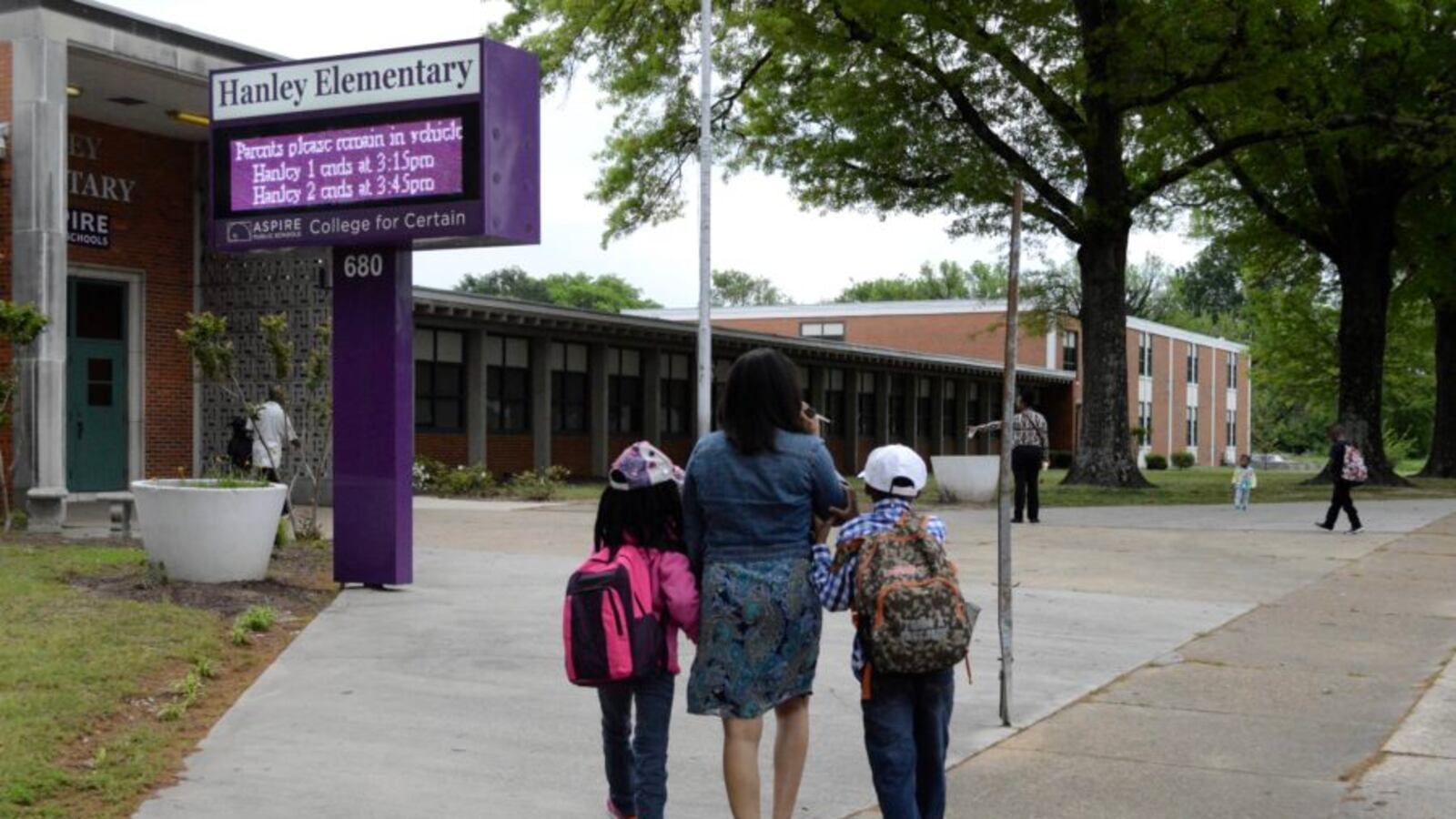Facing a roughly $2 million operating deficit and lagging academic progress, a California-based charter organization that runs four schools in Memphis is reconsidering its future in the city — even floating the possibility of pulling out of the area altogether.
At a public meeting on Friday, Aspire’s national board discussed with its Memphis staff four possible scenarios for moving forward. Board chair Jonathan Garfinkel said that changes are anticipated, given the budget deficit and the fact that academic “results have not been what we’ve hoped.”
As a result, Aspire could cease to oversee its four Memphis schools, which serve some 1,600 students in total. This wouldn’t mean the schools would close, but that the governance of the school would change. A task force — composed of board members, Aspire staff in Memphis and consultants — came up with the following four possible paths forward, though Garfinkel said more possibilities could be considered.
- Memphis remains an Aspire region with additional supports and a plan to close the financial gap.
- Memphis becomes an Aspire “franchise,” keeping the name and core approach and receiving some supports, like curriculum and coaching, but operates as a separate nonprofit with significantly more autonomy.
- The four Memphis schools become a standalone charter network with their own central office and fundraising function.
- The four schools team up with one or more existing local school district or charter network.
If any changes are made, they wouldn’t go into place until after this school year. Garfinkel emphasized that no decisions have been made, and the task force would use Friday’s conversation to steer its board recommendations, slated for January.
During an emotional conversation, local Memphis staff pushed back Friday on the idea that the Memphis operation disaffiliate or spin-off from the national network. Memphis principals Steven Ward and Monique Cincore both said Aspire has had a big impact on their lives and the families they serve.
“Aspire has renewed my faith in education,” Cincore said. “It’s helped me know that there’s a better way to do this work. For that to potentially go away, that brings great sadness to me and my families.”
Aspire Memphis Superintendent Nickalous Manning, pointing toward recent gains in enrollment and test scores, asked for more time before any changes occur.
“Time is of the essence, and not infinite, and neither are resources,” said Manning, a longtime Memphis educator in his first year as leader of Aspire Memphis. “But we need to be thoughtful about knee-jerk dramatic change. We see evidence, though we want to move faster, that we’re seeing some real traction with student growth.”
Manning added that Aspire Memphis’ total operating budget was more than $20 million, and that given time to crunch the numbers and apply for grants, his team might be able to reduce the deficit caused by lower-than-expected enrollment.

Casey Hoffman, director of growth and strategy with the national Aspire organization, said that the task force identified several issues between local staff and the national network: communication with the California-based central office, regional fees, and the desire for more local control.
Aspire Memphis currently pays the national network about $800,000 in home office support, covering the salaries of seven Memphis-based employees. The Memphis group also pays a regional fee of $1.3 million. If the group disaffiliated from the national organization, some of those fees would disappear, but so would the supports.
Aspire originally envisioned the Memphis expansion to consist of 10 or more schools, but the group has only opened four schools in the region since 2013.
The charter network was one of the first outside groups recruited to Memphis to join the state-run Achievement School District five years ago. That represents Aspire’s only growth outside of California. Aspire was founded in California in 1998 and runs 36 schools there.
The network took over two Memphis schools in 2013, and grew to three schools the following year as part of the state-run district, which sought to take over schools academically in the bottom 5 percent and vault them to top performers in five years. As a whole, the district has fallen dramatically short of that goal as it’s struggled to move the needle on student achievement and has closed some schools due to low enrollment.
Aspire Coleman Middle School is one of only nine schools in the Achievement School District that is no longer in the bottom 5 percent of schools, according to the state Department of Education. Aspire Hanley Elementary School also improved enough last year to come off of the state’s list of troubled schools, called the “priority list.”
Aspire also runs Aspire East Academy, a K-3 elementary school, under the local Shelby County Schools. This year, the charter network applied with the district to open its second a middle school, but the local school board and the state Board of Education rejected its application.
Mala Batra, interim chief executive officer with the national Aspire organization, said that prior to the meeting the two Memphis districts hadn’t been contacted on the potential changes.
Stephen Ward, in his second year as principal at Aspire Hanley Middle School, said he was attracted to the job specifically because it was with Aspire, and that distancing from the national charter organization would be potentially devastating for his community.

“Yes, we were supposed to be much larger than we are, but there are advantages,” Ward said. “This is our commitment to stay this size and get good. I have four generations of families in my schools that have option to go elsewhere, but they believe in what we’re doing and in the growth of kids. Even if the physical building is there and the same, I fear their confidence is going to go away without the Aspire name recognition.”
Beth Hunkapiller – an Aspire board member and former director of charter schools at the California Department of Education – emphasized that she believed the Memphis schools had made encouraging progress in a tough turnaround environment.
“There’s enormous debate around how fast turnaround work is expected to go, and I see growth here,” Hunkapiller said, adding that she thought both the option to spin-off and the option to merge with a different charter group would be “destructive and costly.”
Batra said the decision would come down to what’s best for Memphis students. “We know we have to make trade-offs,” she said at the close of the meeting. “And I don’t think we can make a decision without knowing how we can best serve kids moving forward.”
You can view the task force update presentation below:
Correction: A previous version of a photo caption said Aspire East Academy was housed in a former car dealership. It is located in a former furniture store.

